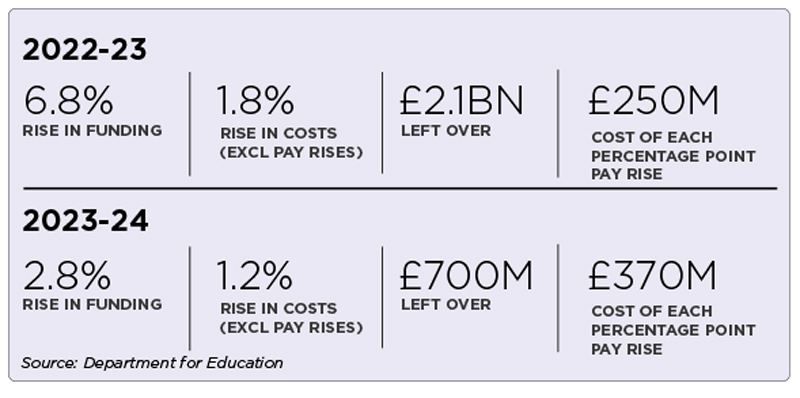The government has told schools to consider saving some of the extra cash they receive next year to meet the “significant” costs of future staff pay rises.
Last year’s spending review allocated an additional £4.7 billion in school funding over the next three years, on top of increases already planned up to 2022-23.
But the additional money will have to cover planned rises in employers’ national insurance contributions, as well as any pay rises awarded to teachers and support staff in the next three years.
New Department for Education (DfE) analysis predicts that each 1 percentage point rise in staff pay would cost around £250 million in 2022-23, and around £370 million in 2023-24.
The figures indicate that a move to offer inflation-matching pay rise for teachers would wipe out much of the new cash.
The new funding is also “front-loaded”, leading to DfE now advising schools to “plan their budget across multiple years”.
In practice, this “could mean schools leaving some of the £2.1 billion of new spending for 2022-23 uncommitted in the longer term” to cover pay awards and “other priorities”, the analysis stated.

Luke Sibieta, a research fellow at the Institute for Fiscal Studies (IFS), said the front-loading of the funding gave schools a “rare chance to do multi-year financial planning”.
“It’s extremely sensible for schools to look at how costs and funding will evolve through to 2024-25.”
School business leadership consultant Hilary Goldsmith said schools “should and do operate a three year budgeting process”, but said they needed more clarity on funding.
“A three year funding deal is fine in year one, but by year two and three, with no news of further funding rates, the front-loading direction is flawed.
“In addition, with a volatile energy market and uncertainty over teacher pay, interest rates and inflation, schools and governing bodies will be wanting to set a secure and robust budget for 2022-23 after two years of turbulence.”
Inflation matching pay rise would cost £1.3bn
In its analysis, the DfE said core funding to mainstream schools will rise by 6.8 per cent in 2022-23.
At the same time, cost pressures are expected to rise by 1.8 per cent. This would leave schools with £2.1 billion to spend before they faced a “net pressure”.
But this doesn’t take into account the costs of anticipated staff pay rises, which DfE estimates will “significantly raise costs”.
In 2023-24, core funding will rise by another 2.8 per cent and costs by 1.2 per cent. This would allow schools to increase spending “by a further 1.6 per cent, or around £700 million”, the DfE said.
However, the estimated £370 million cost of even a 1 percentage point rise in staff pay would absorb more than half of the extra cash.

In reality, much greater rises will be needed to meet the government’s pledge to raise teachers’ starting salaries to £30,000 by 2022-23 – a commitment was pushed back by the pay freeze in 2021.
Education secretary Nadhim Zahawi asked the School Teachers’ Review Body to make recommendations on pay rises for the next two years, as part of the move to raise starting salaries. The body is due to report back in May.
If all teachers’ pay rose by the current rate of inflation, 5.5 per cent, it would cost schools over £1.3 billion next year alone. This is before taking into account the pay ofsupport staff pay, which is set separately.
School finance expert Micon Metcalfe questioned the report’s “assumptions” on costs, which may not “pan out at school or trust level”.
“Pay increases are key. These are currently unknown for 2022 and may be higher than the estimates. Higher than expected pay costs reduce the ability to spend elsewhere.”
Non-staff costs will have ‘muted’ impact
Any change in staff pay will “significantly raise costs as more than 80 per cent of schools’ expenditure in these years will be on pay-related costs”, the DfE said.
Changes in non-staff expenditure, however, would have a “correspondingly muted impact”, the DfE said.
For example, the document notes rising energy costs, but said energy accounted for just 1.4 per cent of spending in 2019-20.

Metcalfe said “most non-staff costs” could be managed, but warned energy was a “concern”.
“Whilst only 2 per cent of total expenditure, it’s likely to double or more for schools that are renewing now.”
Stephen Morales, chief executive of the Institute of School Business Leadership, said the government was trying to “get ahead of criticism” over funding.
The IFS has warned that despite the investment at the spending review, schools still faced an “unprecedented” 15-year freeze.
Morales added: “If the intention of this whole thing is to keep things ticking along and status quo, then yes it probably achieves that. But if you’re talking about significant investment in recovery and closing the gap and pushing on as a world-class education system, then I don’t think it does that.”















Your thoughts